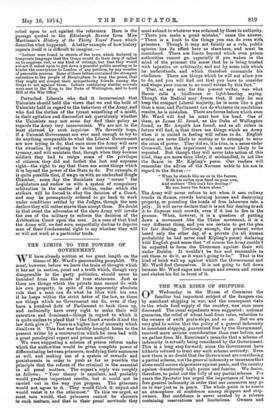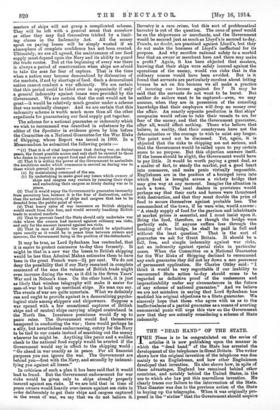THE WAR RISKS OF SHIPPING.
ON Wednesday in the House of Commons the familiar but important subject of the dangers run by merchant shipping in war, and the consequent risks to the whole food supply of the country, was once more discussed. The usual expedients were suggested : national granaries, the relief of wheat-land from rates, subsidies to the owners of swift grain-ships, and so on. But we are very glad to notice that the policy of a general indemnity to merchant shipping, guaranteed free by the Government, received more serious consideration than ever before, and we gather from Mr. Runciman's remarks that a scheme of indemnity is actually being considered by the Government. This is a long step forward, since the Government have hitherto refused to treat any such scheme seriously. Even now there is no doubt that the Government are considering a partial scheme, not the general indemnity or insurancethat alone could secure ahipowners against panic, and the country against disastrously high prices and famine. We desire, therefore, to point out the folly of any partial scheme. For years the Spectator has urged the importance of having is free general indemnity in order that our commerce may go on in war just as in peace. The whole point is to create an atmosphere of confidence among shippers and ship- owners. But confidence is • never created by a scheme containing reservations and limitations. Owners and masters of ships will not grasp a complicated scheme. They will be left with a general sense that somehow or other they may find themselves tricked by a limit- ing clause in the Indemnity Act. All the money spent on paying losses will be simply wasted if an atmosphere of complete confidence has not been created. Ultimately, we are all agreed, the maintenance of our food supply must depend upon the Navy and its ability to guard the trade routes. But at the beginning of every war there is always a period of consternation when ships are afraid to take the seas for fear of capture. That is the time when a nation may become demoralized by dislocation of the markets, if not by shortage of food. Such a demoralized nation cannot conduct a war efficiently. We are certain that this period could be tided over in equanimity if only a general indemnity against losses were provided by the Government. We are certain that the cost would not be great—it would be relatively much greater under a scheme that was nominally cheaper. And we are certain that this indemnity scheme is worth much more than all the other expedients for guaranteeing our food supply put together.
The scheme for a national guarantee or indemnity which we wish to recommend was described in substance by the editor of the Spectator in evidence given by him before the Committee on a National Guarantee for the War Risks of Shipping, whose Report was issued in 1908. In a Memorandum he submitted the following points .0 (1) That it is of vital importance that during war, as during peace, the freest possible access and exit shall be secured to those who desire to import or export food and other merchandise. (2) That it is within the power of the Government to assimilate the conditions under which commerce is carried on during war to those which prevail in peace
(a) By maintaining command of the sea. (b) By undertaking to make good any losses which owners of ships and cargoes may sustain by running their ships and embarking their cargoes as freely during war as in peaCCI. (3) That it would repay the Government to guarantee immunity from pecuniary loss, because it is the fear of destruction, rather than the actual destruction, of ships and cargoes that has to be dreaded from the public point of view.
(4) That heavy rates of war insurance on British shipping would result from this fear, and would severely handicap British trade in neutral markets.
(5) That to prevent fraud the State should only undertake war risks where the owners had insured against ordinary sea risks, and only for the amount insured against sea risks. (6) That in ease of dispute the policy should be adjudicated upon exactly as it would be in pease time between owners and insurers, the Government being in the position of the defendants."
It may be true, as Lord Sydenbam has contended, that it is easier to protect commerce to-day than formerly. It might be that in a new war the losses to British shipping would be less than Admiral Mahan estimates them to have been in the great French wars-2 per cent. We do not deny the possibility that if our Navy remained in complete command of the seas the volume of British trade might even increase during the war, as it did in the Seven Years' War and in Nelson's time. On the other band, it is just as likely that wireless telegraphy will make it easier for men-of-war to hold up merchant ships. No man can say. The events of war are quite uncertain. What we definitely can and ought to provide against is a demoralizing psycho- logical state among shippers and shipowners. Suppose a war opened with a few sensational captures of British ships and of neutral ships carrying alleged contraband in the North Sea. Insurance premiums would fly up to panic rates. The Government would find themselves hampered in conducting the war ; there would perhaps be a silly, but nevertheless embarrassing, outcry for the Navy to be tied to our coasts instead of searching out the enemy wherever he might be. Anything like panic and a sudden check to the national food supply would be averted if the Government would say in effect to the shipping world : "Go ahead in war exactly as in peace. For all financial purposes you can ignore the war. The Government are behind you—first with the Navy, and secondly by indemni- fying you against all losses."
In criticism of such a plan it has been said that it would lead to fraud. But the Government endorsement for war risks would be given only to ships already properly insured against sea risks. If we are told that in time of peace owners would heavily over-insure against sea risks in order deliberately to get their ships and cargoes captured in the event of war, we say that we do not believe it. Barratry is a rare crime, but this sort of problematical barratry is out of the question. The onus of proof would be on the shipowners or merchants, and the Government would be secured just as much as Lloyd's is secured to-day. Frauds, no doubt, are practised against Lloyd's, but they do not make the business of Lloyd's ineffectual for its purpose. And why sacrifice national safety to a morbid fear that an owner or merchant here and there may make a profit ? Again, it has been objected that masters, knowing that their ships were safely insured against the operations of the enemy, would run risks that in the ordinary course would have been avoided. But is it found that servants are particularly careless about letting houses be set on fire because we all make a practice of insuring our houses against fire ? It may be said that the servants do not want to be burnt. But neither do sailors want to be captured—even, we may assume, when they are in possession of the consoling knowledge that their employers will drop no money over the affair. An exactly opposite prediction is that ships' companies would refuse to take their vessels to sea for fear of the enemy, and that the Government guarantee, after all, would effect nothing. Those who believe that believe, in reality, that their countrymen have not the determination or the courage to -wish to exist any longer. The point need not be discussed. Yet, again, it is objected that the risks to shipping are not serious, and that the Government would be called upon to pay certain sums to no purpose. But this objection answers itself. If the losses should be slight, the Government would have to pay little. It would ho worth paying a great deal, as a matter of fact, to steady the market, put a good heart into commerce, and make panic virtually impossible. Englishmen are in the position of a besieged town into which food is brought across a rickety bridge that may give way at any moment. Imagine the situation in such a town. The local dealers in provisions would perhaps say that their carts and horses were threatened with destruction, and that they must double the price of food to secure themselves against probable loss. The commandant of the town, if he were wise, would answer : "A steady supply of food for the garrison and inhabitants at market prices is essential, and I must insist upon it. Bring the food, therefore, as though the bridge were perfectly safe. If anyone suffers loss through the breaking of the bridge, he shall be paid in full and without the least. question." That is the sort of guarantee we ask for Great Britain. It should be a full, free, and simple indemnity against war risks, not an indemnity against special risks in particular zones. When the Committee on a National Guarantee for the War Risks of Shipping declined to recommend any such guarantee they did not lay down a non possumus of permanent application. Sir Charles Ottley said : " think it would be very regrettable if our inability to recommend State action to-day should come to be regarded as definitive proof of the uselessness and impracticability under any circumstances in the future of any scheme of national guarantee." And we believe we are not mistaken in saying that Lord Sydenhain has modified his original objections to a State guarantee. We sincerely hope that those who agree with us as to the ineffectualness of a partial guarantee as a means of averting commercial panic will urge this view on the Government now that they are actually considering a scheme of State indemnity.











































 Previous page
Previous page